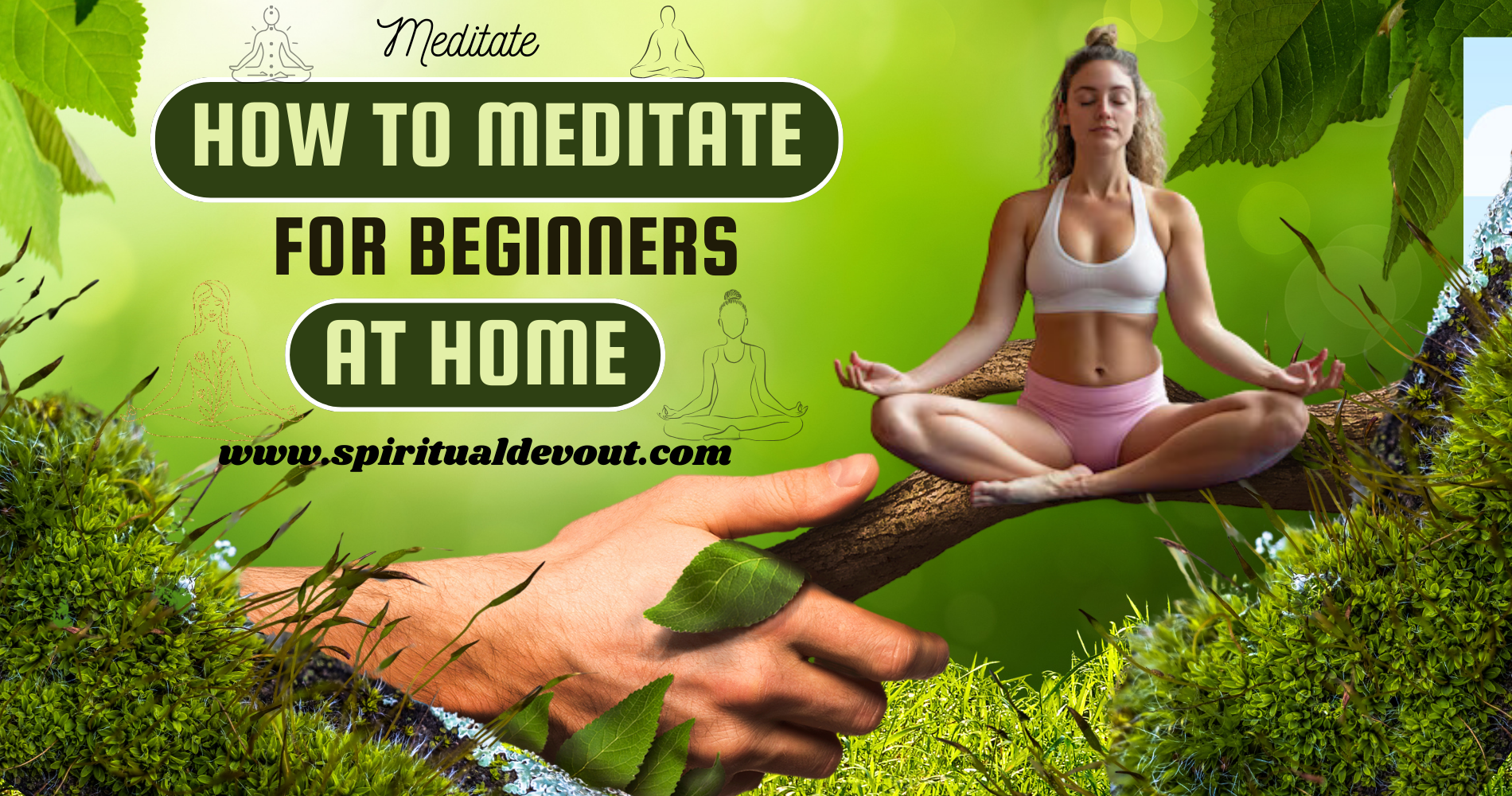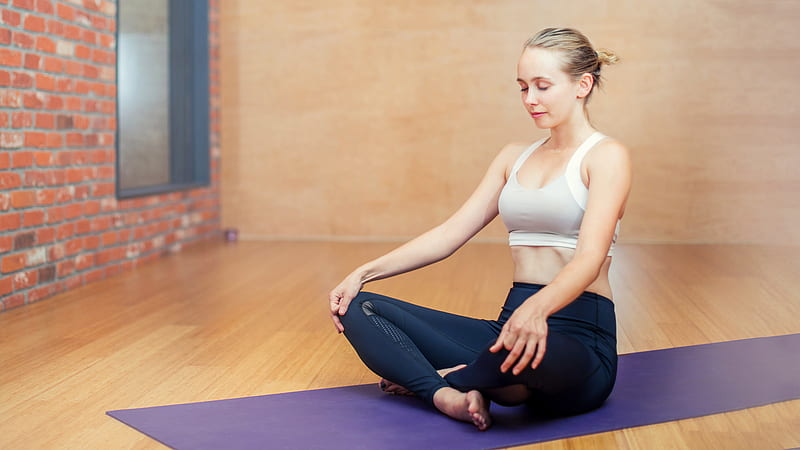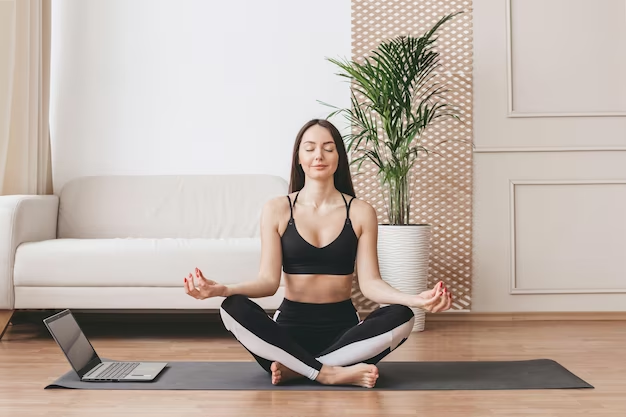
One effective technique that can greatly enhance both our mental and physical health is meditation. Regular meditation has been shown to reduce stress, increase mental clarity, and even improve sleep quality. One of the most alluring advantages of meditation is its ability to calm our brains' incessant chatter, which enables us to access our intuition and live more completely in the here and now. How to meditate for beginners at home however, we lose out on life's richness when we are not there. The scent of our dog's fur as we cuddle, the sun's warmth against our skin, a loved one's smile, and the taste of dark chocolate as we relish each morsel.
There is always a space of calm within us, no matter how quickly life is passing outside. We may stop searching for peace and tranquility and recognize that it is already here by teaching our minds to live more in the present. Here are seven simple steps to get you started with meditation.

The fundamental idea of meditation is to focus deliberate attention on your body, mind, and state of awareness, although there are numerous variations in its interpretation and style. A collection of techniques known as meditation uses a consciousness-altering method to enhance physical well-being.
For thousands of years, people from many cultures have included meditation into their everyday routines. Almost every religion incorporates meditation in one way or another. Additionally, meditation may be used as a psychotherapy method. Concentrative and mindfulness meditation are the two primary forms. People do, however, use different techniques for meditation.
In order to achieve a heightened state of being, concentrative meditation involves concentrating on a single idea while the outside world is blurred in the background. In contrast, mindfulness meditation entails becoming acutely aware of the present moment while maintaining an open and receptive mindset.
Read also: Meditation For Reducing Negative Thoughts
There are tremendous advantages to altering your brain's thought patterns when you are in a conscious state of openness and awareness. It has been demonstrated that deliberate and regular meditation practice alters the neural connections in the brain, promoting improved concentration, attention, and introspection.
People with developmental problems benefit from meditation, as can people who suffer from headaches and stress. Among the advantages of meditation:

It's critical to keep in mind that a wandering mind is a normal aspect of meditation. It's not a failure; rather, it's a necessary element of learning. Even seasoned meditators occasionally experience daydreaming.
It's difficult to recognize when we're becoming sidetracked by a notion and to deliberately return our attention to the breath. Just give yourself a pat on the back for noticing when your thoughts stray when you first begin to meditate. After that, you may return your attention to your breathing.

It's possible that you've already seen our mindfulness video. Including this in your meditation might be beneficial, as it may help you concentrate on the here and now. Consciously paying attention to your senses is one method.
After you are at ease, close your eyes and concentrate on your other senses. Take note of how the duvet, carpet, or mat feels under you. What do you hear? What scent do you detect? Do you have a certain taste in your mouth? You may feel more in tune with your body and less preoccupied with your thoughts.

All you need is a warm, cozy place to sit; no extra equipment is required. A yoga mat might be helpful if you wish to sit cross-legged on the floor, but a towel or rug would also do. Some choose to sit on their bed or in a chair.
You need to be able to stand up straight and be comfortable. Slumping is not as beneficial to your body as sitting with proper posture; for some people, a meditation cushion might assist. Make sure the chair or bed you're in provides support so you don't slump into it.
Read also: Top 7 Powerful Meditation for Women

Let your hands rest naturally and don't think about them. While some individuals like to have their hands folded in their lap, others prefer to hold them in a mudra posture on their knees, with the thumb and pointer finger squeezed together. Do whatever makes you feel the most at ease.

This is the main goal of meditation. Give yourself something constructive to concentrate on, like your breath, rather than attempting to block out thoughts. Let the concerns of the outside world drift away as you focus on your breaths.
Avoid clenching your jaw or grinding your teeth, and breathe through your nose while keeping your mouth shut. Consider concentrating on the sensation of air passing through your nostrils or the expansion and contraction of your lungs.

During meditation, it's acceptable if your thoughts start to stray. Instead of trying to stop your thoughts, let them come and go. Put your attention back on your breathing and ignore outside distractions.
Observe whether distracting ideas or thoughts occur during your inhalations or exhalations. Make use of this information to shift your attention back to certain areas of your practice. Try counting your breaths if you have trouble focusing.

It takes time to become proficient in meditation, which is why it's a practice! When you're just starting out, try not to be too harsh on yourself. With time, you'll develop your meditation skills. Being attentive is, after all, a lifelong endeavor.
Make it a goal to meditate for a little while each day. Your workouts will grow simpler, and you'll experience greater advantages the more consistently you follow your routines. When you're lacking motivation, try installing a meditation app like Headspace or Calm or participating in online guided meditations.

Do you ever find yourself overanalyzing things? This is your opportunity to observe your ideas without becoming enmeshed in them. It's critical to acknowledge them before letting them go. Let them pass like clouds don't follow or interact with them.
Take note of the ideas that are there, such as I have to go to the grocery shop, and I need to contact my mom. Let every idea arise and go by without passing judgment or becoming attached.

Since this phase involves checking in with our bodies, it's fantastic. How often do we ask people how they're doing each day? A wonderful deal. How often do we question our bodies, How are you? throughout the day? Almost never. Look around your body and identify any tense spots or sensations.
The goal of this stage is to focus on your body and take note of any feelings you may be experiencing. Tension, discomfort, itching, warmth, or coolness are some examples of this. Work from your feet to your head, or vice versa. This enables you to completely engage with the current moment and connect with your body.
Additionally, during meditation, be mindful of any ideas or mental diversions that may come up and let them go without attachment or judgment. Just return your attention to your breathing if your thoughts do stray.
Read also: Top 8 Benefits of Meditation: A Comprehensive Guide

You can begin meditating after you're at ease and focused. Just inhale while closing your eyes and mentally repeating the phrase breathe in. Then exhale, then exhale again. You should focus on this circular breath and the simple phrases for 20 minutes or more.
Although meditation comes in a variety of forms, they all have the potential to reduce stress over time. Meditation may help us relieve mental problems by releasing physical tension in the body.
This can alleviate worry, stress, and depression, and it can even help you sleep deeper and more soundly.
Additionally, meditation can help us become more peaceful so that we can react to life's situations with composure rather than letting our emotions run wild. Try to include regular meditation into your daily schedule for the best effects.
When you initially begin meditation, you don't yet have the abilities or routines necessary to get the full benefits. It will be simpler to observe the benefits the sooner you incorporate meditation into your daily practice. The following are some guidelines to adhere to when meditating:
1. Establish Your Intentions and Goals: If your objective is to practice one day each week, schedule the time on your calendar and set a timer. Prioritizing your practice is essential, but don't take on too much at once. Instead, get to where you want to be gradually.
2. Perfection Is Not the Goal: You will give up quickly if you begin with the belief that your practice will be flawless. Instead of aiming for perfection at first, concentrate on regularly finishing your practice.
3. Find Your Space: You will feel more at ease, secure, and at peace if you practice in the same area every time.
4. Experiment with Different Meditation Techniques: You don't have to use the same methods every time. To provide you with a strong foundation as a beginning, you might wish to attempt a guided meditation.
Creating a meditation routine at home is an easy yet deep way to improve your general well-being. You may develop a durable habit that blends in with your everyday routine by setting up a peaceful area, making reasonable goals, and using simple methods. There is no right or wrong method to start meditation constancy and an open mind are what count. Keep in mind that meditation is a personal experience.
You'll probably feel more inner calm, less tension, and better attention as you practice with this approach. With effort and dedication, meditation may develop into a powerful tool that can assist you in facing life's challenges with calm and visibility. Start now and enjoy the deep mental and social benefits.
This one basic principle drives all meditation practices, whether ancient and modern: Whatever you are doing right now must be precisely what you are doing right now, and nothing else.
The process of connecting our consciousness with the Divine is called meditation. Aum is therefore a potent mantra for meditation. Aum Guru is a powerful mantra because it represents the Aum, the Divine Mother, and the dissolution—the process of removing the obstacles separate our present curiosity from Divine consciousness.
Start from your toes and work your way up to your head, paying slow attention to each area of your body. Take note of the sensations in each location and intentionally let go of any tension. Make use of a meditation guide. Don't worry, guided meditation applications can assist if you're not sure where to begin or have trouble focusing.
Life is more expansive than that. He suggests meditating for no more than twenty minutes, and occasionally for less than five. According to Lakhiani, most people will see the changes they need in 15 to 20 minutes. You can experience amazing advances with just one to three minutes of meditation.
Disclaimer: SPIRITUAL DEVOUT claims no credit for images featured on our blog site unless otherwise noted. All visual content is copyrighted to its respectful owners.